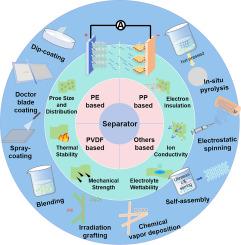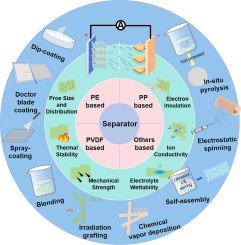Research progress of alumina ultrafine powder modified lithium-ion battery separators
IF 13.2
1区 工程技术
Q1 ENGINEERING, CHEMICAL
引用次数: 0
Abstract
Lithium-ion batteries with the advantages of high energy density and low self-discharge rate provide a strong guarantee for a long-lasting power supply. The separator, a critical component of lithium-ion batteries, plays a pivotal role in determining their performance and safety. As the demand for high energy density batteries grows, traditional polyolefin separators face significant challenges due to their inherent limitations, including high thermal shrinkage and poor electrolyte wettability. In this context, alumina ultrafine powder has emerged as an ideal material for separator functionalization, owing to its exceptional heat resistance, chemical stability, and surface modifiability. This paper presents the first in-depth review of the research progress in alumina ultrafine powder modification for lithium-ion battery separators, encompassing preparation methods, modification mechanisms, and performance impacts. It highlights the unique advantages of alumina in enhancing thermal stability, mechanical strength, and electrochemical properties of separators. This comprehensive analysis aims to provide clear directions for future research and accelerate advancements in this promising field.


氧化铝超细粉改性锂离子电池隔膜的研究进展
锂离子电池具有能量密度高、自放电率低的优点,为长期供电提供了有力保障。隔膜是锂离子电池的关键部件,在决定锂离子电池的性能和安全性方面起着关键作用。随着对高能量密度电池需求的增长,传统的聚烯烃分离器由于其固有的局限性,包括高热收缩率和较差的电解质润湿性,面临着巨大的挑战。在这种情况下,氧化铝超细粉末因其优异的耐热性、化学稳定性和表面可改性性而成为隔膜功能化的理想材料。本文首次深入综述了锂离子电池隔膜用氧化铝超细粉改性的研究进展,包括制备方法、改性机理和对性能的影响。突出了氧化铝在提高隔膜的热稳定性、机械强度和电化学性能方面的独特优势。这一综合分析旨在为未来的研究提供明确的方向,并加速这一有前途的领域的进展。
本文章由计算机程序翻译,如有差异,请以英文原文为准。
求助全文
约1分钟内获得全文
求助全文
来源期刊

Chemical Engineering Journal
工程技术-工程:化工
CiteScore
21.70
自引率
9.30%
发文量
6781
审稿时长
2.4 months
期刊介绍:
The Chemical Engineering Journal is an international research journal that invites contributions of original and novel fundamental research. It aims to provide an international platform for presenting original fundamental research, interpretative reviews, and discussions on new developments in chemical engineering. The journal welcomes papers that describe novel theory and its practical application, as well as those that demonstrate the transfer of techniques from other disciplines. It also welcomes reports on carefully conducted experimental work that is soundly interpreted. The main focus of the journal is on original and rigorous research results that have broad significance. The Catalysis section within the Chemical Engineering Journal focuses specifically on Experimental and Theoretical studies in the fields of heterogeneous catalysis, molecular catalysis, and biocatalysis. These studies have industrial impact on various sectors such as chemicals, energy, materials, foods, healthcare, and environmental protection.
 求助内容:
求助内容: 应助结果提醒方式:
应助结果提醒方式:


